Researching Divestment
Topics: South African apartheid; Divest Barnard; Fossil fuels; Israel; Palestine; Board of Trustees; President’s Office; Committee on Investments
Divestment, also known as divestiture, refers to when a business sells off some assets (e.g. stocks, property, subsidiaries) to achieve some financial, ethical, or political goal. To divest from a business or class of businesses (e.g. energy companies that utilize fossil fuels) means to end financial and business relationships with them so neither party may continue to benefit financially from the other.
A divestment campaign involves coordinated efforts by people who oppose an institution’s investments or business ties to particular types of companies, usually for political or ethical reasons. Divestment campaigns in higher education have typically been driven by student organizers and activists who plan coordinated actions on campuses to place pressure on administrators to cut financial ties countries or businesses which contribute to mass death, violence, social injustice, and/or environmental destruction.
Here are some materials that document the response of Barnard administration to divestment campaigns.
Divestment from South Africa
Campaigns to divest from businesses operating in South Africa in protest of the nation’s system of apartheid had existed in the U.S and internationally since the 1960s. By taking a look at the archives of student publications the Barnard Bulletin and the Columbia Spectator, it is clear that divestment was an issue on Barnard and Columbia students’ minds by the early 1970s.
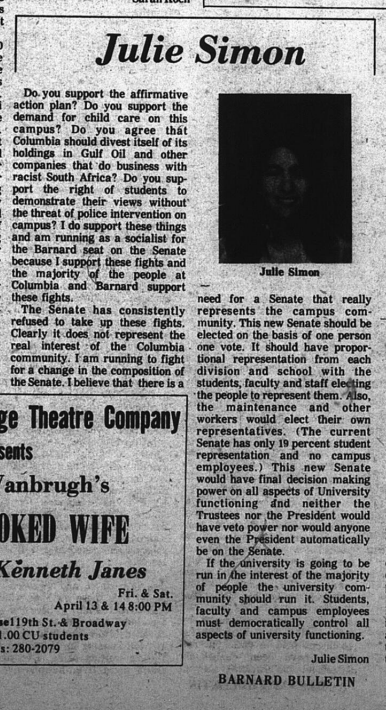
Student support for divestment campaigns
In this issue of the Barnard Bulletin published on April 12, 1973, a Barnard student named Julie Simon stated that, as a candidate for the Barnard undergrad student seat on the Columbia Senate, she supported divestment campaigns in protest of the College’s business ties to South Africa and Gulf Oil among other social issues.
The Board of Trustees Records in the Barnard Archives includes many materials that shed light on the College administration’s discussions of divestment. In the wake of intense student protests and the well-documented occupation of Hamilton Hall in April 1985, the Board of Trustees began taking concrete actions to enact an official divestment policy on South Africa business holdings in spring 1985. Here are a few excerpts of meeting minutes contained in the February 1984-December 1985 volume of meeting minutes, located in Subseries 1.1, Box 8 of the Board of Trustees Records.
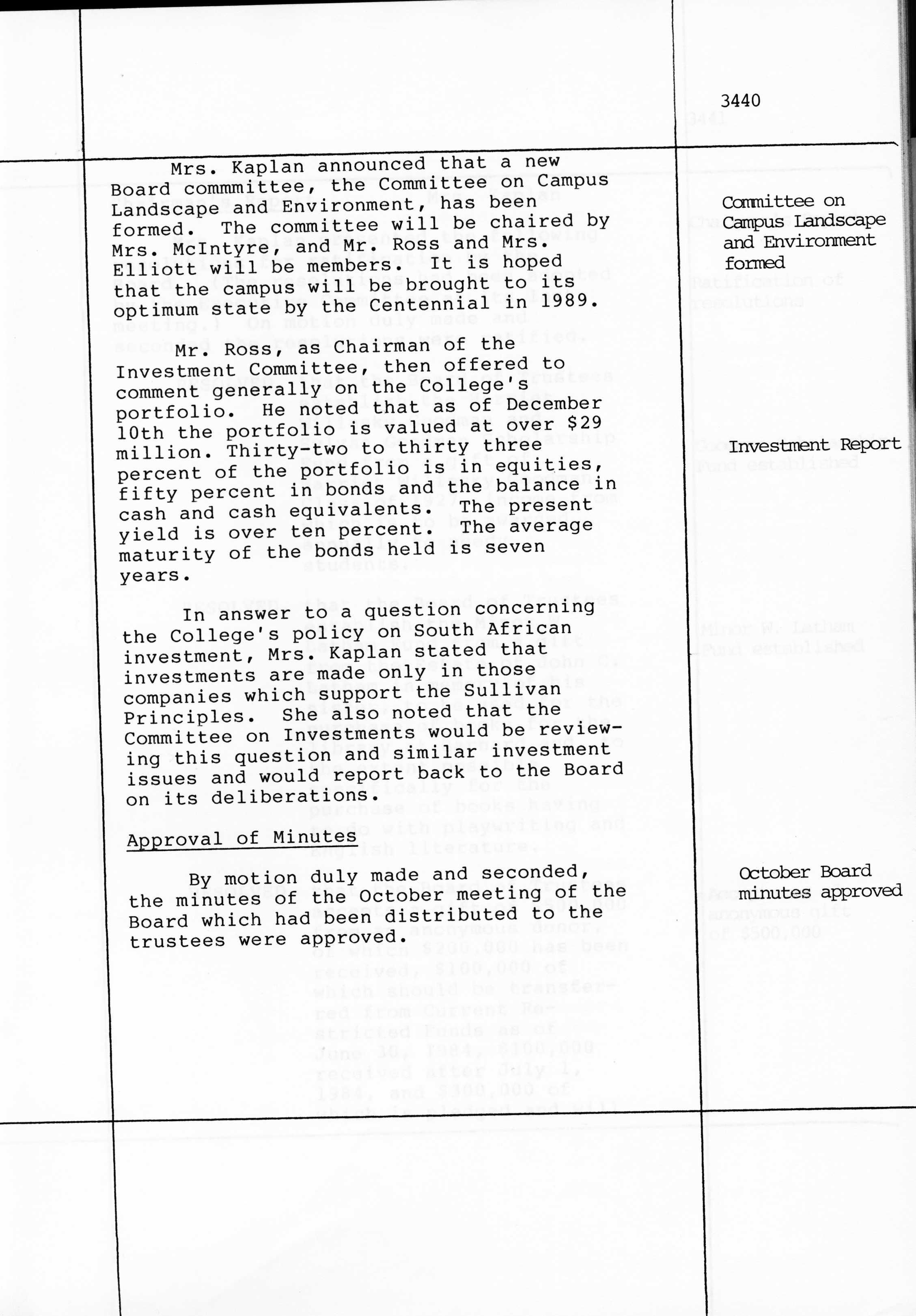
The Board’s official resolution to divest from businesses with operations in South Africa was passed on May 29, 1985:
This letter from Barnard President Ellen Futter, located in the Correspondence sub-series of the Board of Trustees Records, announced the Board’s complete divestment from South Africa to the wider Barnard community:
On the same date as Ellen Futter’s letter, Columbia’s Office of Public Information released a report from the Ad Hoc Committee Regarding Investments in Companies with Operations in South Africa. The committee recommended that the Columbia Board of Trustees divest its $39M of common stock of American corporations with operations in South Africa within two years. The committee report is followed by a statement from Columbia spokeperson Fred Knubel, in which he states that the committee report will not be voted on until the Trustees’ next meeting on October 7. In the statement, Knubel argues that the committee’s report is not in response to student protest, but rather the result of the committee’s independent research into the social and economic consequences of divestment.
From 1985 to 1993, the South Africa policy was frequently referenced by the Investment Committee, a standing Board committee that manages the “investment and reinvestment of the funds of the College” and establishes “investment guidelines in accordance with an investment policy approved by the Board”[1]. Boxes 63 and 64 in Subseries 3.5 cover the 1980s and 1990s, at which time the College’s policies on South African investments were often under discussion:
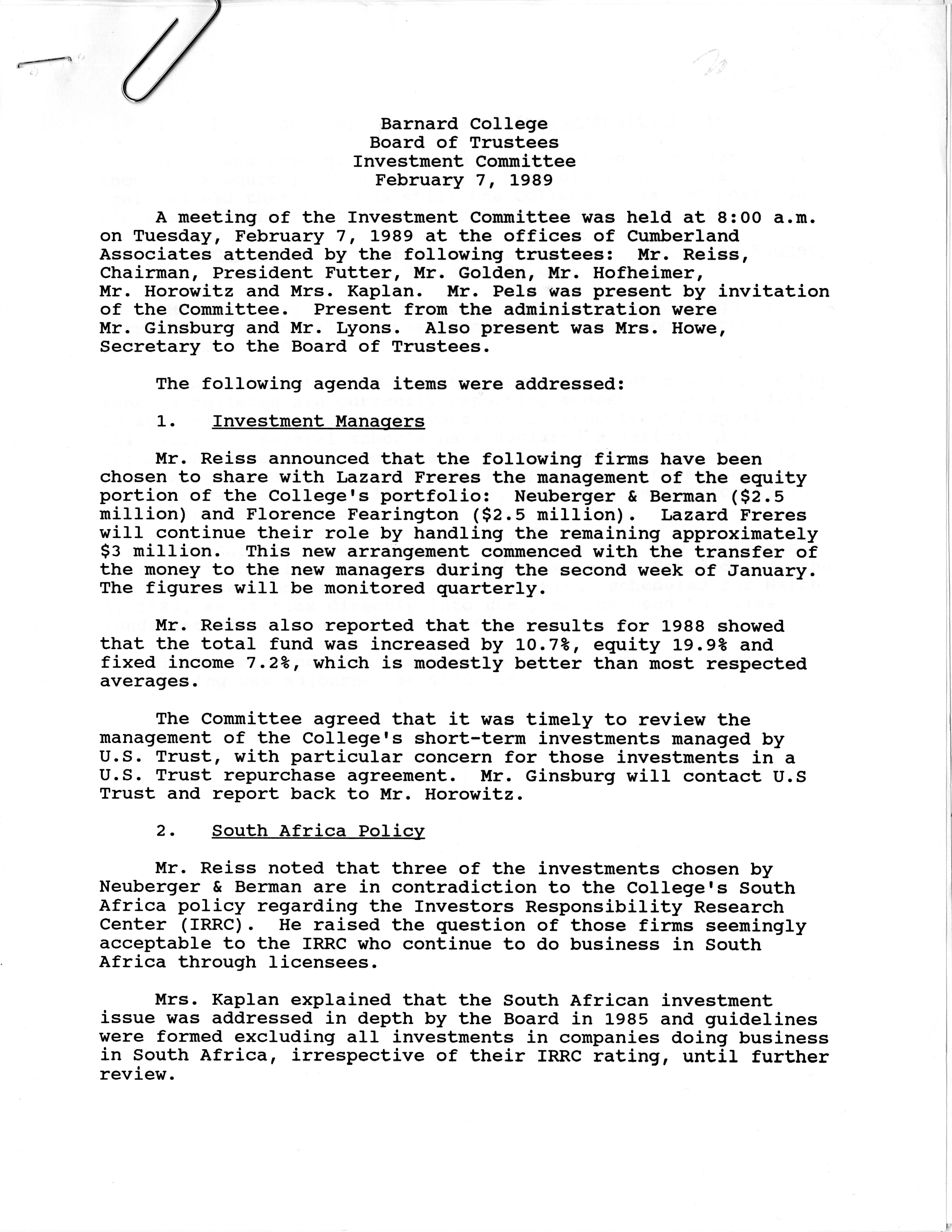
Following calls from Nelson Mandela for US institutions to reinvest in South Africa given the abolition of apartheid in 1994 and the improvement of social conditions, the Board quickly moved to reverse its 1985 divestment policy:
Divestment from Israel
Administrative materials related to campus debates about Israel-Palestine appear most prominently in Series 6 of the President’s Office Records. Series 6 contains correspondence between Barnard College President Judith R. Shapiro (1994-2008) and academic departments, professors, administrators, administrative departments, students, and donors.
Shapiro released this statement on November 7, 2002 in response to a petition signed by Barnard and Columbia community members calling on academic institutions to sanction Israel in response to increased violence in Israel-Palestine:
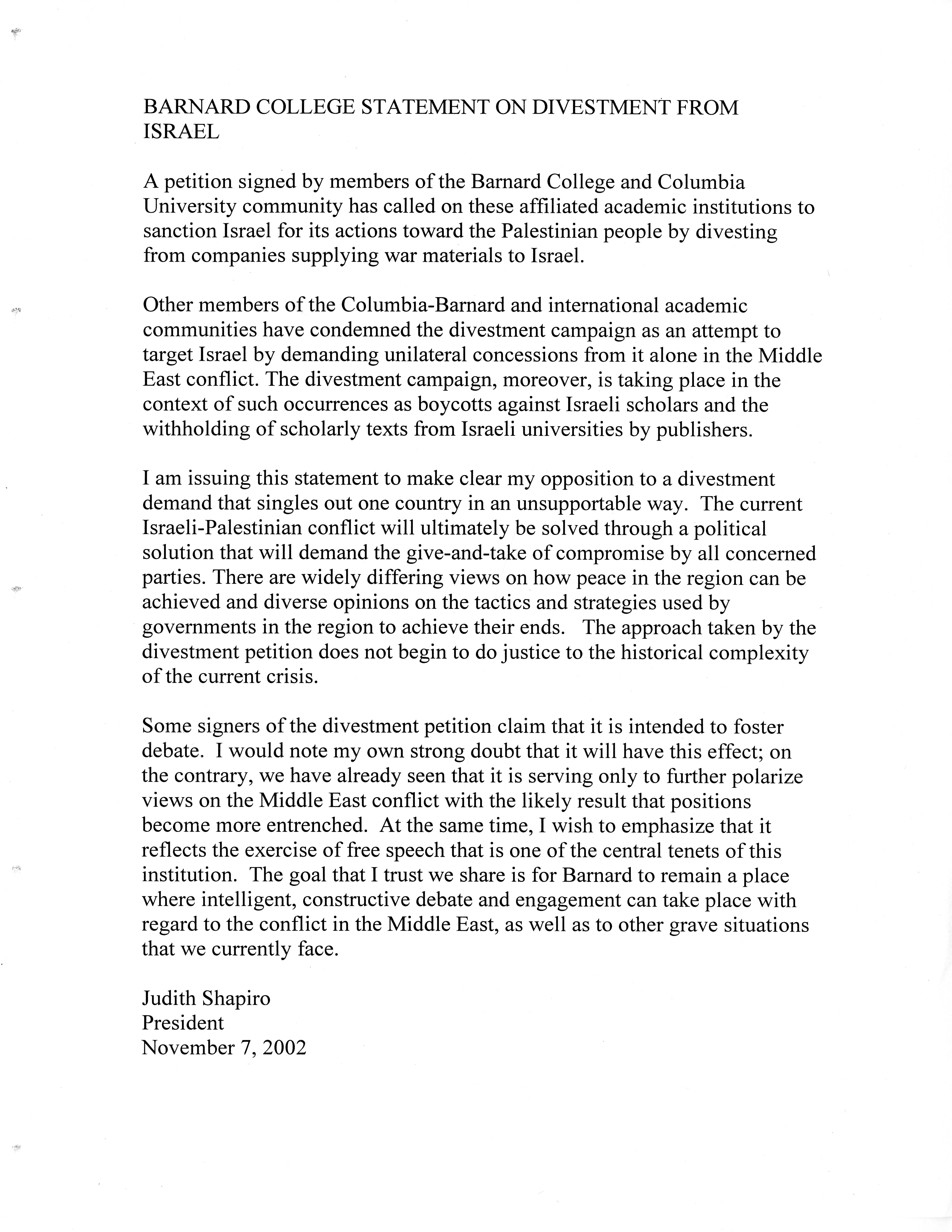
Divestment from fossil fuels
The student-led movement for fossil fuel divestment in the US saw significant growth in the 2010s. In their article titled “Fossil fuel divestment in US higher education: student-led organizing for climate justice,” Jessica Grady-Benson and Brinda Sarathy observe two primary motivations for students’ increased climate activism: “On one hand, the student movement for FFD may be understood as a response to years of inadequate political action to address climate change and the social consequences of fossil fuel extraction and production. On the other hand, it is also an alternative to insufficient attempts at individualised environmental responsibility which encourages consumer-based approaches such as personal carbon footprint reduction” [2].
The campaign for fossil fuel divestment at Barnard is preserved in the Barnard Archives primarily within the Divest Barnard collection. Divest Barnard was a student organization founded in 2014 that actively organized protest actions, educational events, and communications with Barnard administrators with the goal of pressuring Barnard admin to divest from fossil fuel companies contributing to global climate change.
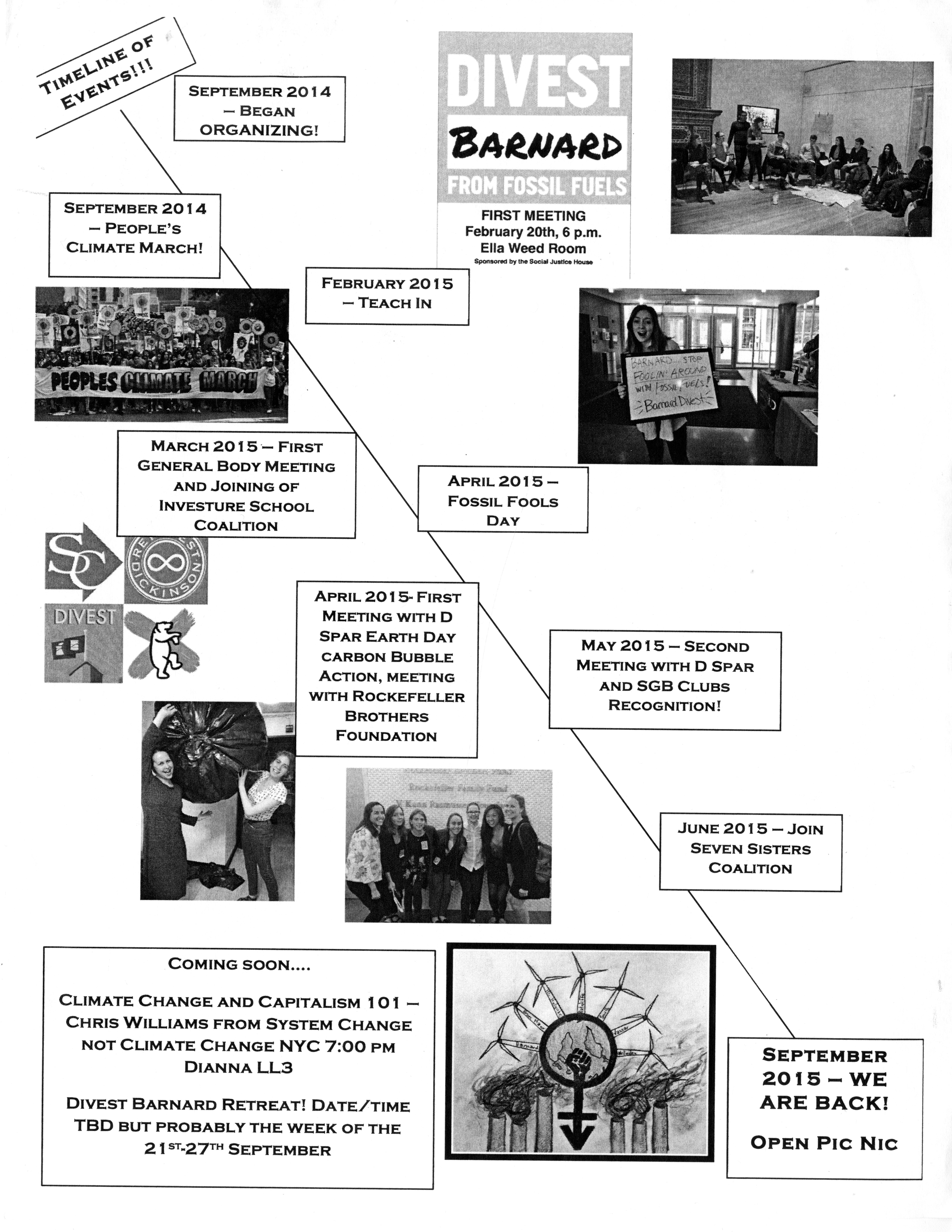
Organizational timeline
This graphic shows a timeline of Divest Barnard’s activities from its founding in September 2014 through September 2015.
Members of Divest Barnard compiled research and publications regarding the broader movement for fossil fuel divestment, as sharing resources and information across institutions throughout the country was important for organizing effective actions and communications:
In response to increasing campus organizing and discussions about fossil fuel divestment, Barnard’s Board of Trustees established a Presidential Task Force to Examine Divestment on December 9, 2015. The Task Force comprised trustees, faculty, staff, and students including two representatives from Divest Barnard. The Task Force collaborated throughout 2016 and 2017 to compile research about the strategies and impacts of fossil fuel divestments historically and at different higher education institutions. The Task Force eventually produced a final report which recommended that the Board of Trustees divest from fossil fuel companies that deny climate science. The Divest Barnard representatives maintained meeting agendas, draft reports, presentation slides, research publications, and notes from their participation in the Task Force, all of which are now located in Box 9, Folders 9-11 in the Divest Barnard collection. Here are a few materials that illustrate the development of the Task Force’s administration, research, and recommendations:
This draft of the Task Force’s final report, which is undated but likely authored during the fall of 2016, includes over 50 pages of research on climate change and fossil fuel divestment at higher education institutions:
Questions & Group Exercise
- What is the document? Who created the document, when did they create it, where did they created, why did they create it, and how did they create it?
- Where does your eye go first? What do you see that you didn’t expect?
- Are there any additional actors or voices aside from the creator(s) who left their mark on the material? What marks have archivists left? What do these marks tell you about the intentions behind the collection and preservation of the material?
- What is not communicated in the document and why?
- What can you infer about the broader campus, city, national, and/or international context in which a particular material was created?
- How would you contextualize this item within a larger research project or question? What other types of sources would you need to answer your questions about this item?
- What is different about the language and tone that administrators use when communicating to students about divestment compared to when students communicate to other students? Or when administrators communicate with other administrators?
- In what ways do/could these materials serve as precedent for our current moment?
Work collaboratively to develop a digital timeline of divestment campaigns at Barnard using a platform like Knight Lab’s Timeline JS. Small groups of students/participants could each create a timeline for one particular divestment campaign (e.g. South African apartheid, fossil fuels), or each group can be responsible for adding 2-3 events to a collective timeline that includes all types of divestment campaigns.
Citations
- Board of Trustees meeting minutes, 1978 - 1989, Sub-series 1.1, Box: 8. Board of Trustees Records, BC01-01. Barnard Archives and Special Collections.
- Board of Trustees meeting minutes, 1989 - 2003, Sub-series 1.1, Box: 9. Board of Trustees Records, BC01-01. Barnard Archives and Special Collections.
- Correspondence, 1970s-1980s, Sub-series 2.3, Box: 39, Folder 3. Board of Trustees Records, BC01-01. Barnard Archives and Special Collections.
- Committee on Investments, 1982 - 1990, Sub-series 3.5, Box: 63, Folders: 5-6. Board of Trustees Records, BC01-01. Barnard Archives and Special Collections.
- Committee on Investments, 1990 - 1997, Sub-series 3.5, Box: 64, Folders: 1-9. Board of Trustees Records, BC01-01. Barnard Archives and Special Collections.
- Barnard College statement on divestment from Israel, 2002-11-07, Subseries 6.1, Box: 199, Folder: 9. President's Office records, BC05-22. Barnard Archives and Special Collections.
- Divest Barnard Collection, 2010-2017; Box and Folder or URL; Barnard Archives and Special Collections, Barnard Library, Barnard College.
- Bylaws of Barnard College as of June 7, 2023, BC-01_001. Board of Trustees Records, 1882-2023; Barnard Archives and Special Collections, Barnard Library, Barnard College.
- Grady-Benson, Jessica, and Brinda Sarathy. 2016. “Fossil Fuel Divestment in US Higher Education: Student-Led Organising for Climate Justice.” Local Environment 21 (6): 661–81. doi:10.1080/13549839.2015.1009825.